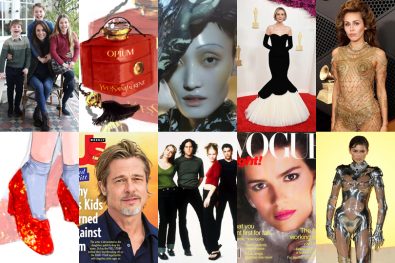When Eminem released Stan in 2000 it told the story of a “stalker fan” who relentlessly wrote to the rapper about his personal life and how much his music meant to him. It starts to spiral when Eminem doesn’t write Stan back fast enough which eventually leads Stan to his own demise. At the time it served as a cautionary tale to not put all of your faith into a stranger that doesn’t know you exist and instead seek help from loved ones and professionals if you need it. Twenty three years later “Stan” is a commonly used term to describe someone who is a super fan of an artist and it’s worn like a badge of honour. In 2023, we would also describe Stan’s relationship with Eminem as a parasocial one. He believed he was owed as much energy and attention from his favourite artist in return for his loyal devotion to consuming Eminem’s music. You may have heard people talking about parasocial relationships with public figures when you scroll on your favourite social media app. For the most part they’re pretty harmless but they can also be taken to the extreme if the fan fails to recognize the social boundaries that exist between themselves and the artist.
Everydayhealth.com describes a parasocial relationship as a one-sided-relationship where one person will spend time, money, and energy on another person that doesn’t know they even exist. This could be as simple as knowing that your celeb crush enjoys six shots of espresso in their coffee order, or buying tickets to several stops on your favourite artist’s tour. You celebrate their wins like you’re on their professional team and maybe you also get a little upset when they get a bit of bad press. Parasocial relationships aren’t a new thing either. The term was officially coined in 1956 by Horton and Whol as a way to explain the unique connection people were beginning to have with entertainers and media personalities. They stated that consumers were getting a specific type of intimacy from entertainers, which created a false sense that there was a personal relationship between the viewer and the talent. We can argue that we first saw parasocial relationships in full swing during the height of Elvis’s career or even Beatlemania in the mid ‘60s. Fans of the British band exhibited all sorts of extreme and in some cases, unsafe behaviour in order to get close to the members of the band. A parasocial relationship is completely one-sided, but it can still feel very real to the people that are in them. Until pretty recently, the only way people could keep tabs on musicians and movie stars was through newspapers and magazines. Now, thanks to social media platforms like Instagram and TikTok, your favourite celeb is usually just a click away.
Social media can make it feel like you know the ins and outs of a stranger’s life just from seeing a few photos or short videos. But making public figures more accessible to fans means the internet can quickly become an unsafe space if boundaries aren’t set in place. Pedro Pascal dominated social media feeds during the first three months of 2023. For weeks my FYP was filled with dreamy fan edits of clips from Pascal in Narcos and The Mandalorian. It didn’t take long until Pedro was officially named “the internet’s daddy” (cringe) and it got so out of control every interviewer he came into contact with referred to him as such (double cringe). We were suddenly watching the parasocial relationship behaviour extended from just fans like we had previously seen to professionals, too. Somewhere in the mix, Pascal disabled comments on his Instagram presumably to keep his corner of the internet free from fans projecting the intimate thoughts of their parasocial relationship back onto him.
While Pascal may have stumbled into this type of behaviour from fans unexpectedly, Taylor Swift has built her entire career making her supporters feel like best friends. She’s interacted with fans from her various social media accounts for years, invited fans to an exclusive backstage lounge at her concerts to meet her after the show, and has even welcomed a select few to her home, baked them cookies, and let them listen to albums before they’re released. Swift once championed these unique relationships with her fans, but has pulled back in recent years. Since the pandemic her already massive fan base has continued to explode, and she no longer opens her private spaces to fans. In between stops of her record-breaking Eras Tour hundreds of her adoring fans crowd the sidewalk outside of an NYC recording studio in hopes of getting a personal interaction even though the singer has stated in her own Miss Americana documentary that this specific fan behaviour makes her feel unsafe.
This extreme shift in behaviour is where we’re currently at with parasocial relationships. While some can recognize that their adoration is a one-way street, others can develop a sense of entitlement with what they get back from the person they staunchly support. It is no longer enough for some fans to respectfully enjoy the content they are given. Between items getting thrown on stage and injuring artists like Bebe Rexha or Kelsea Ballerini, a container of human ashes being passed up to P!nk while she’s singing, and a number of sexually explicit signs directed at Harry Styles during his concerts, fans are finding new ways to show their “love” to artists in ways that are disruptive and disrespectful. Parasocial relationships are now pushing boundaries between performers and their audience to new and scary places. Although it feels like we may know so much about them, we have to remember that these people are not actually our friends and when they’re in a vulnerable position performing for us, the least we can do is treat them with respect.
One of the main problems seems to be that people don’t know that their behaviour online and the comments they can (bot not necessarily should) post shouldn’t really be taken offline and into the real world. I think it’s more than fair for artists to start putting more distance between themselves and the people they perform for to keep themselves safe. While a parasocial relationship can be as fun and harmless in the same way having an imaginary friend was when you were a kid, it can be really easy to get caught up and ignore the social boundaries between the artist and the consumer, especially online. After all, they’re just strangers and we aren’t really owed anything beyond enjoying the performance we bought a ticket for.












